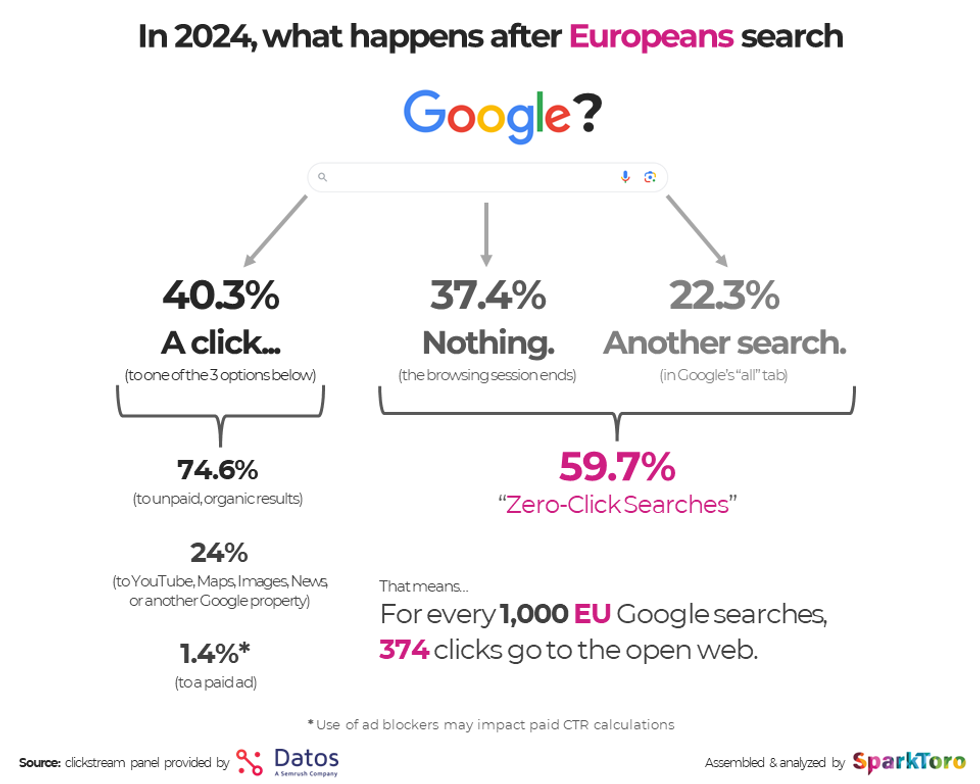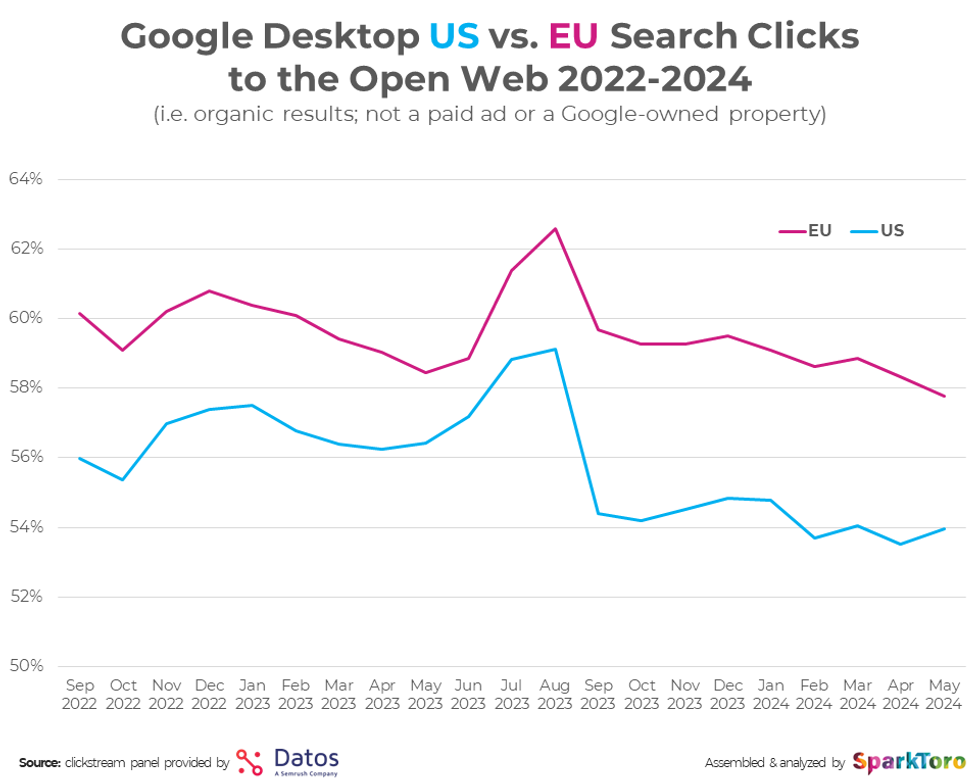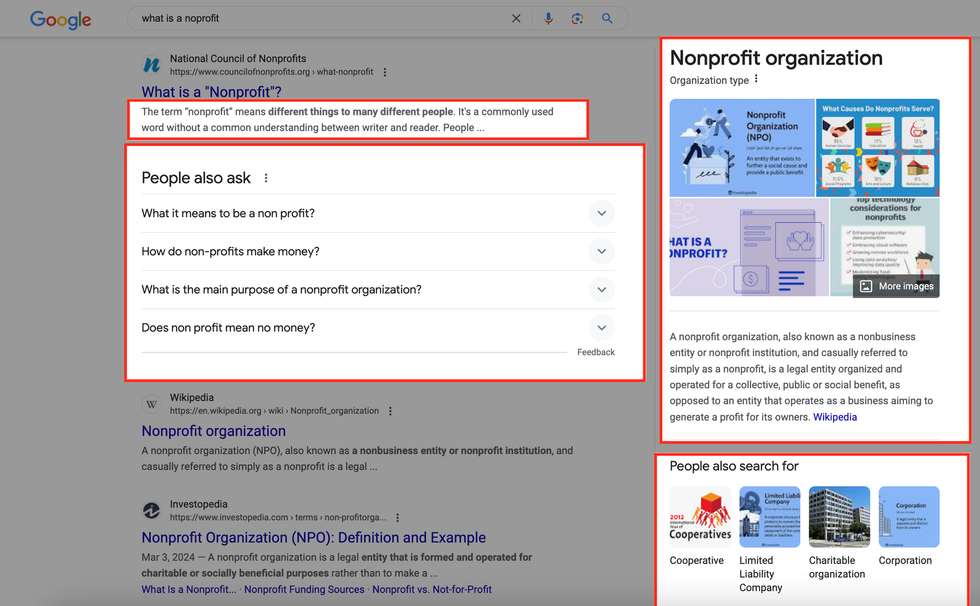Publishers are feeling the squeeze across organic search lately, and now there’s data to prove just how much Google’s dominance is growing. A new joint study by
SparkToro and Datos analyzed Google Search behavior in 2024 so far, with a focus on what happens after users search.
The study leveraged a multimillion clickstream panel, which means it was able to track the sequence of clicks from millions of users after they started a search query. This data set is more comprehensive because it doesn’t just focus on specific subsets or keywords. Clickstream panels track the entire search journey, which is usually varied and often contains multiple searches that all differ in click behavior.
Click here to read the full insights from SparkToro and Datos’ study.
The data is from users located in the United States and the European Union. Let’s take a look at some of the key insights.
What Happens After Americans Search?
Datos and SparkToro
- As you can see from the data above, zero-click searches make up 58.5% of mobile and desktop searches in the U.S. This means users aren’t clicking on any results after performing a search.
- Nearly 30% of clicks direct to Google-owned properties, including YouTube, Google Images, and Google News.
- For every 1,000 Google searches in the U.S., 360 clicks will go to the open web.
Let’s take a look at how those results compare to searches performed by users in the European Union.
What Happens After Europeans Search?
 Datos and SparkToro
Datos and SparkToro
- The data above shows us that zero-click searches are just slightly higher in the EU, with 59.7% of searches not ending in a click.
- Clicks to the open web are a bit higher in the EU, with 374 clicks out of 1,000 searches leading to properties outside of Google.
- Clicks to Google-owned properties are lower in the EU, with 24% of clicks ending up on Google’s other platforms.
- The smaller number of Google-centric clicks could be attributed to the EU’s Digital Markets Act, which reduces traffic to Google-owned properties.
A Snapshot of Google’s Dominance
 Datos and SparkToro
Datos and SparkToro
The chart above shows organic search clicks to the open web in the U.S. and the EU from 2022 to 2024. Aside from a brief increase in clicks through to the open web in the summer of 2023, the overall trend is downward for publishers outside of Google.
The data shows us that Google continues to direct less traffic to the open web, even as total search numbers increase. One positive note is that the overall volume of traffic Google sends to the open web remains relatively stable, thanks to the increasing number of searches.
These insights can be a cause of alarm for publishers who are already feeling the pressure to produce authoritative, helpful content that not only ranks high across search, but grabs the attention of users enough to get them to click outside of the Google sphere.
How to Stay Competitive Across Search
While the study does reiterate the competitive nature of search in 2024, there are still plenty of strategies publishers can use to maintain their search visibility.
Here are two great ways to stay ahead:
- Focus on Zero-Click Content: As you can see from the SparkToro and Datos study, zero-click searches are high. However, you can focus on zero-click content that optimizes for that type of user behavior. Zero-click content includes featured snippets, rich answers, and formatting content for Google’s “People also ask” module.
 Examples of zero-click content in Google Search results.
Examples of zero-click content in Google Search results.
- Don’t Skip Out on Technical SEO: Ensuring your content is optimized for search is of course the most important way to gain visibility across search. However, the next critical step is to make sure your content follows Google’s guidelines for user experience to ensure it makes it to the top of search results. This includes optimizing for structured data, meta descriptions, headlines, proper taxonomy, and more. Click here for more information.
Get the Right Search Support
RebelMouse is an AI-enabled, cloud-based CMS that is specifically designed to optimize content for search in the new digital climate. Our proprietary technology not only sets up your site for success across search, but our platform offers full technical support right out of the box. Upon launch, your site will already be optimized for zero-click content and all of the crucial technical SEO aspects you need to stay ahead.
If you need help staying competitive on search, request a demo today and let’s start working together.


